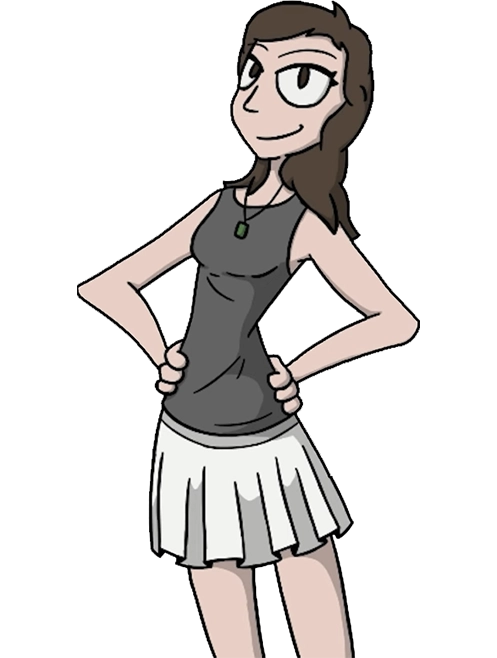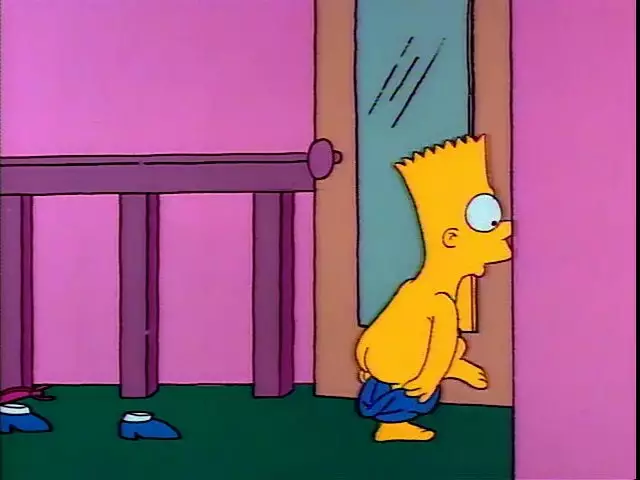My Recollection
The end is at the start. A serious tone. Not very funny.
The Episode
There’s a few reasons why a narrative may start at its own end before returning to explain how they got there. The first is that it’s a hook. Starting a story with something that demands an answer is an easy way to suck people in because seeing a what triggers our curiosity regarding the how. The second can be to add a framing device to the narrative, such as having a specific character retell what’s happened or otherwise function as the narrative perspective. The third is simply to add variety by differing from a standard narrative direction, and all three can be used in various mixes. This episode does all three and the first one it does quite well. Starting with Homer and Bart walking toward the centre of town, with the head of Jebediah, then getting confronted by the town who have already formed an angry mob really does make me want to see what happened. Easy hook. The second it fucks up almost immediately.
The thing about using a character’s perspective as a framing device for the plot is that they have to be there for the things that the audience sees, especially if the narrative is based on said character actually relating what happened to an in-universe audience. Bart wants to plead his case to his would-be murderers and begins to explain what happened, then the show has scenes that Bart wasn’t present for. This is not a big surprise as the narrative shuffle was something that happened late in production, meaning elements couldn’t be changed to fit the new perspective. That said, it actually does work as a clever way of covering for another problem which is the murderous mob.
In later episodes, the idea of Springfield being easily whipped into a murderous lynching party is, like a lot of the rubber band reality, an established absurdity the show can dip in and out of as necessary. Starting something like this is kind of tricky, though, particularly as season one’s more grounded approach to their world. Later seasons emphasised the comic stupidity of the mob, like when they went to get cider in Bart’s Inner Child, but this one is savage and humourless. They want to beat a child to death for vandalising a statue and that’s a tricky thing to show the start of without highlighting the stupidity of the idea within the context of a sitcom. This episode cleverly uses the nonlinear narrative to hide the start of the mob entirely. The mob is already formed at the start and by the time the show returns to the moment, the narrative has focused the audience on the matter of Bart’s reasons for decapitating the Jebediah Springfield statue. The lynch mob idea is now in the series, and frequently used again, without ever having to really validate it or take it seriously at all.
Aside from the narrative chicanery, when compared to Lisa the Iconoclast this episode is a novel example of the pendulum swing of historical studies. The Telltale Head presents Jebediah wholly uncritically, and Bart’s hallucination of him is an idealised one. It’s the complete opposite of the figure we eventually see, and have confirmed as real, in the later episode. History is a lot like this. Imagine the Twitter habit of competing hot takes but over decades and with academics. People will worship someone, then they’ll be recast as a monster, then they’ll be judged within their historical context and seen as good again. If this keeps up enough there’ll be some kind of split and different camps will form. A whole new area of study, historiography, emerged out of this. It’s the study of the study of history and as absurd as that sounds it’s actually a very dynamic and interesting discipline.
Aside from Bart’s story, there’s a few stray scenes which don’t coalesce into anything meaningful and they stand out because of that. There’s some canonically contradicted stuff about how the Simpson church disapproves of gambling which leads to a tension between Homer and Marge that goes absolutely nowhere and contributes nothing to the plot. These are too connected to be filler scenes with throwaway gags, and I suspect there was probably a B story conclusion here that was cut at some point. The fact that they’re a largely unfunny, stunted B story subtracts from an episode that is already very light on decent jokes but the primary story manages to make up the difference.
The story uses the “why over what” focus of it’s starting in medias res to craft an excellent character episode for Bart. Bart’s perpetual ten has morphed over the years, from what is clearly a child to a young adult with a series of girlfriends and this change happens fairly quickly. This was inevitable as there’s very little you can really do with a faithfully written ten year old (seriously, go look at a ten year old) not covered in Bart the Genius and Bart Gets an F (on second thought, do not go look at a ten year old). Concurrent to this was the evolving nature of cool and how that had to be balanced with Bart’s stories. This early cool was not the unflappable cockiness kind that has Skinner sign its yearbook, and this adds an important layer of vulnerability to Bart. This vulnerability makes his idolisation of the bullies introduced in this episode, the stalwart side characters Jimbo, Kearney, and Dolph, make far more sense than in later episodes like This Little Wiggy. Bart’s love of the bad was always borderline parody, if not something unrealistic enough to be in a fundamentalist pamphlet on the effects of crime novels/crime movies/comic books/movies again/television/videogames. This episode, and similar from the early seasons, works because what later cool makes parody, current vulnerability makes real.
There’s a tension between the length of the series and the original ideas it has available to it that force status quo resets that grow more and more overt as the show drags on. There’s no effort to reset the status quo in these old episodes, just a general disregard for plot and character developments. Season two’s Bart Gets an F is all about Bart trying to leave the 4th grade, it’s been 26 years and that still hasn’t happened. Less overt than this were Bart’s character growth moments at the ends of stories like this one which work largely because the show doesn’t even try to revert them before the credits roll. After a while, it becomes obvious that Bart’s never going to really change, and that’s when the parody cool moves in and the vulnerable child vanishes. The vulnerability in The Telltale Head helps ground his character in the realistic childhood need for a distinct identity, one that manifests in the face of Homer’s dismal parenting as self-assertion through transgression, and this makes one of his most famous acts of misbehaviour his most genuine.
Yours in getting kicked out of every Space Mutants movie, Gabriel.
Jokes, lines and stray thoughts.
“You know son, when I was your age I pulled a few boners” HAHAHAHAHAHAHAHAHAH gaaaaaaaaaaaaaaaaaay lol
This episode actually has a title card, which I’m pretty sure we don’t see again until 22 Short Films About Springfield
The mob really is a malicious one and not a funny one which is bizarre for a lot of reasons, I mean, Grampa is in there and he wants to butcher his grandson. It gets worse and worse the more you think about it and that’s why the mob scenes are usually goofy so they enter the joke universe of absurdity. They’re a real threat here, the story and characters treat them as such, which would totally shaft most of the plot were it not snuck in so craftily and disbanded so quickly.
This episode has the first example of Smither’s crush on Mr Burns with the less than subtle line, “The feeling is more than mutual, sir” in response to Burns’ emotional outpouring. Smithers being gay for Burns is so goddamned old that nobody questions it but it’s such an odd thing to add to the series if you think about it. It began as Sam Simon’s idea to make him gay but to never directly draw attention to it. This went out the window immediately because there’s no way to make jokes about him wanting to fuck Mr Burns without explicitly drawing attention to it, so for a while he was essentially a Burns-sexual, with a major coming out episode revolving around Patty instead. By definition, allusions are not explicit but if you pile up enough of them, as subsequent seasons do, it becomes fucking obvious Smithers is just gay. More recent episodes have basically confirmed this.
The scene with the Sunday school teacher is funny both in content and because of her nebulous existence. The children are there occasionally, but largely they are in church with their parents and there’s never been a firm explanation as to why. Bart’s expulsion, mentioned in Bart’s Girlfriend, is about as close as it gets but that doesn’t explain Lisa so I’m marking it as early sloppiness. The content itself, is fairly funny too, because Bart’s absurd questions really are taken seriously by a lot of those Sunday school types.
When Bart asks where the bullies got their stuff, Dolph says, “Five finger discount, man” despite existing in a universe where everyone has only three fingers and a thumb. Jimbo would later use the idiom correctly in Marge Be Not Proud.
That his full name is Jebediah Obadiah Zachariah Jedediah Springfield amuses me greatly.
The guy who comes out to shoo the kids away from the statue uses looped audio and it’s noticeably mechanical.
Sideshow Bob shows up in this episode! His first appearance and with different hair.





Comment on The Telltale Head
To reply, please Log in